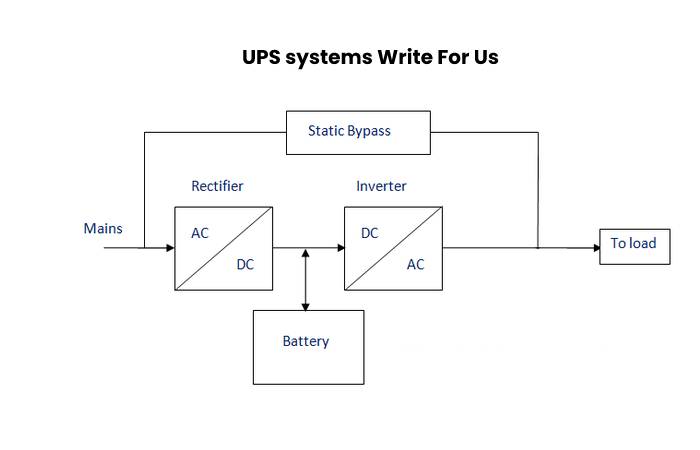UPS systems Write For Us

UPS systems are a source of electrical supply with batteries that provide electrical power for a limited time to electronic devices during an electrical interruption. It also protects against power supply anomalies such as voltage spikes, voltage fluctuations, signal noise, harmonics, and other problems that cause our electrical devices to function abnormally or, worst case, to get damaged. For Submitting Your Articles, you can email us at contact@supercomputerworld.com
What are the different types of UPS systems?
All three fundamental uninterruptible power supply (UPS) technologies have their place in protecting today’s distributed IT infrastructure, especially at the edge of the network. Each technology has its benefits, and each may be needed to set up low-cost power protection, especially in complex systems. Selecting a UPS for your specific application requires consideration of many factors. When choosing a UPS for backup power, the size of the load, the location and criticality of the equipment to be protected, and budget considerations are essential.
The three main types of UPS system configurations are online double conversion, line-interactive, and offline (also known as standby and battery backup). These UPS systems are defined by how current flows through the unit.
Online Double Conversion
The alternating current is stable and clean when generated. But during transmission and distribution, brownouts, spikes, and blackouts can interrupt computer operations, cause data loss, and damage devices. Regarding protecting critical IT loads, only online double-conversion technology provides complete protection against all these power issues and provides the highest level of network security.
An online UPS system is also commonly known as a double conversion because the incoming power is converted to direct current (DC) and then back to alternating current. This AC-DC/DC-AC design ensures a higher degree of load isolation from anomalies in the main supply.
The online UPS takes incoming AC power and converts it to DC using a rectifier to control the battery and connected load through the inverter, eliminating the need for power transfer switches. If the main AC involvement fails, the rectifier shuts down, and the batteries maintain power flow to equipment connected to the UPS. When AC input power is give back, the rectifier will return to carrying most of the load and begin charging the batteries.
Interactive Line
Line-interactive UPS systems provide power conditioning and battery backup. This technology is particularly effective in rare blackouts, but power fluctuations are common. Line-interactive UPS systems accommodate a wide range of input voltage fluctuations before switching to battery backup.
Beyond battery backup, the online line interactive UPS offers much better control over power fluctuations than offline systems. The essential advantage of the line interactive UPS is the boost circuitry and input voltage range that this UPS accepts. The greater the content, the greater the protection.
Line-interactive UPS system provides power conditioning with a 4-6 msec power outage when switched to battery backup and protects against the most common power problems found on a network. Here, the UPS also screens the voltage level and compensates for under and overvoltage. This technology offers a good trade-off between adequate safety and moderate operating costs.
So With line-interactive UPS, the inverter becomes part of the output and is always on. The inverter can work in reverse to charge the battery while the AC input is standard and switch to battery power when the input fails, providing filtering and voltage regulation. Line-interactive UPS systems rely on the battery for power conditioning. It drains the battery more often than online UPS systems, which condition power through the double-conversion process.
Offline/Standby/Battery Backup
Offline UPS, also called standby UPS system or battery backup, is a gainful option. The best offline UPS systems switch to batteries quickly enough to avoid power anomalies and withstand brief blackouts. An offline UPS protects against most surges but does not maintain perfect performance during minor brownouts and heaves.
The key to offline UPS excellence is the range of power the unit will draw before switching to battery backup. The longer the content, the lower the battery consumption and the longer the operating time when the power is turned off. The more often the UPS switches to battery backup, the shorter the battery life.
Offline UPS technology protects against most power spikes by reducing surges and helps survive over 90% of all
How to Submit Your Articles
For Submitting Your Articles, you can email us at contact@supercomputerworld.com
Why Write For Super Computer World – UPS systems Write For Us
- Writing for Supercomputerworld can give massive exposure to your website for customers looking for UPS systems.
- Supercomputerworld presence is on UPS systems, and we will share your article with the UPS systems – related audience.
- You can reach out to UPS systems enthusiasts.
Search Related Terms to UPS systems Write For Us
mains power
protection
emergency power system
batteries
standby generator
super capacitors
data center
continual power system.
Fairbanks
Alaska
Telecommunication
electric power quality.
Rectifying
fuel cell
overvoltage
Search Terms for UPS systems Write For Us
UPS systems Write For Us
looking for guest posts
submit an article
writers wanted
guest posts wanted
submit the post
contributing writer
guest posting guidelines
become a guest blogger
guest post
becomes an author
suggest a post
contributor guidelines
guest posts wanted
Guidelines for Article to Writing UPS systems Write For Us
We at Tips from Digital Websiteblog welcomes fresh and unique content related to UPS systems.
Tips from Supercomputerworld a minimum of 500+ words related to UPS systems.
The editorial team of Tips from Digital Website blog not encourage promotional content UPS systems Post For publishing an article at Supercomputerworld UPS systems Guest Post us at contact@supercomputerworld.com
Related Pages

